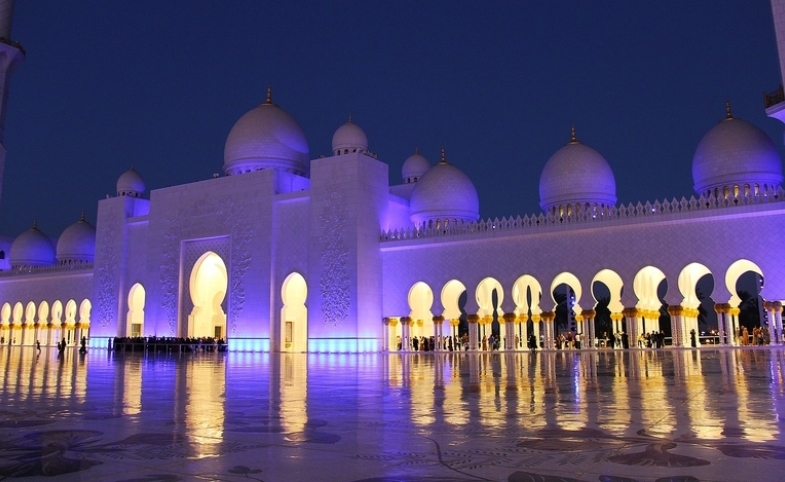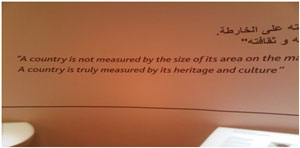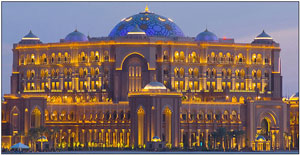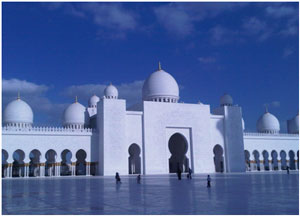The Baker Institute for Public Policy has recently published a report titled, Changing Minds, Making Peace: U. S. Public Diplomacy Strategy in Support of an Israeli-Palestinian Two-State Solution, which emphasizes the...
KEEP READINGThe CPD Blog is intended to stimulate dialog among scholars and practitioners from around the world in the public diplomacy sphere. The opinions represented here are the authors' own and do not necessarily reflect CPD's views. For blogger guidelines, click here.

Corporate Diplomacy Perspectives—The View from Abu Dhabi

I had the great fortune to be in Abu Dhabi two weeks ago leading a group of MBA students from USF as part of their Global Immersions study abroad program. Most of the students are executives pursuing their MBA part-time and this was for many their first visit to the region. At the beginning of our trip, I cautioned them as I do any group of Western executives new to the region about what I call the Three R’s for conducting business in the GCC:
- Respect – Your mindset should be I am a guest in their country, and at all times should be respectful of their customs, traditions, and modes of behavior
- Reaction – Be mindful of how you react to circumstances that are different from those at home; exercise patience and restraint in surfacing negative reactions and responses
- Relationships – The most important lesson to remember when conducting business in the GCC revolves around relationships. Relationships are everything. Exhaustive amounts of time and care should be devoted to fostering and nurturing relationships.
I also spent a good deal of time explaining the rich symbolism we witnessed at every turn even in the most urban settings. I asked the students to be consciously aware of these symbols during our trip as so much of our attention, naturally, was often pulled to the latest innovations and dazzling architectural achievements on display. We spent the first half of the week in Dubai meeting with business leaders from every sector. Dubai for me is as it has always been these past few years, vibrant, optimistic, and progressive. Even in the darkest days of the recession Dubai has exhibited these qualities and now they are back with a vengeance as more and more investment and development pushes ahead. We also had the distinct privilege of being in Dubai when Secretary Clinton was visiting, which always provides a unique window into a country’s and region’s view of US foreign policy and leadership. From all accounts the Secretary was well received, even embraced, by much of the UAE and Pan-Arab press. This in a week where Sudan and Tunisia dominated coverage, and the shootings in Tucson raised concerns about the levels of violence in the US. Geopolitically, we could not have picked a better week to be in Dubai.
Abu Dhabi, though, had the most lasting imprint on our delegation. In its quiet, elegant, thoughtful way it left an indelible impression even on those of us who had been before. Abu Dhabi is a unique case study in corporate and public diplomacy and one of myriad contradictions. The quote I captured from a display at Emirates Palace from His Highness Sheikh Zayed, former President of the UAE, sums up Abu Dhabi perfectly: “A country is not measured by the size of its area on a map. A country is truly measured by its heritage and culture.” The emphasis on and investment in heritage and culture was everywhere throughout the city juxtaposed to advertisements for the World Future Energy Summit this past week, and FerrariWorld. Abu Dhabi has historically been known primarily as an international financial powerhouse and source of immense oil and natural gas reserves. These elements of Abu Dhabi have only multiplied and matured over the years and those investment firms which were also historically very private and closed off from the world are now seeking to engage with the world.
One example of this shift to greater transparency and a distinctly corporate diplomacy point of view was our meeting with leadership at the Abu Dhabi Investment Authority (ADIA). ADIA was incredibly candid and open about their various investment approaches and what struck me was their focus on and commitment to building understanding with the broader international community. This from a firm who only recently added a website presence and began issuing press releases on their efforts. They see their move towards openness and engagement as something others will likely emulate in years to come.

Perhaps the most indelible impressions however came from our host the Abu Dhabi Tourism Authority (ADTA). Dear friends at ADTA planned most of our day and personally guided our visits in Abu Dhabi answering questions, sharing insights, and helping us understand the broader approach Abu Dhabi was taking towards its own development. ADTA’s hospitality was, in short, extraordinary. I am always inspired and humbled by Arab hospitality in general, and this was above and beyond any of our expectations. When we toured the Emirates Palace we were struck by the Saadiyat Island exhibition on planned cultural development. The emphasis on the arts and cultural projects coupled with unique living environments geared towards families was awe-inspiring and world-class. Unlike The Palm developments in Dubai which cater to the very wealthy and extensions of the hospitality sector, Abu Dhabi is focusing more on the families who live and work there. Throughout our day the presence of H.H. Sheikh Zayed was palpable. Whether through the many portraits displayed along the corniche or in his quotes placed strategically throughout the city, you could feel his presence guiding us. If you visit His Highness’ website you will feel some of what we felt on the ground.
We ended our day at the Grand Mosque with a private tour, guided by an Islamic scholar who exerted tremendous patience, answering every question we had over the course of more than two hours. It was fitting, after beginning the day with a business focus, to end the day in reflection. I reminded the students of the meaning of the term January. It derives from the Latin term Janus, the two-headed Roman god who could at once see both the past and the future. Here in Abu Dhabi, where we could vividly see the past and future, we left eager to return.

Visit CPD's Online Library
Explore CPD's vast online database featuring the latest books, articles, speeches and information on international organizations dedicated to public diplomacy.
POPULAR ARTICLES
-
March 22
-
February 23
-
February 22
-
March 4
-
April 1
Join the Conversation
Interested in contributing to the CPD Blog? We welcome your posts. Read our guidelines and find out how you can submit blogs and photo essays >.













